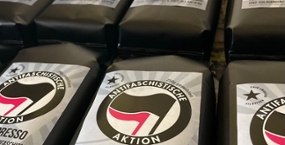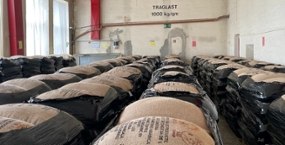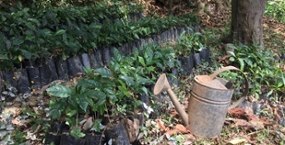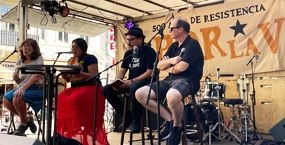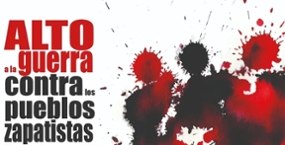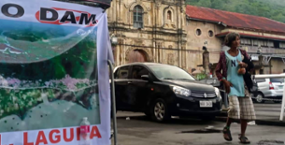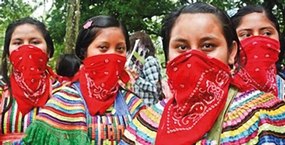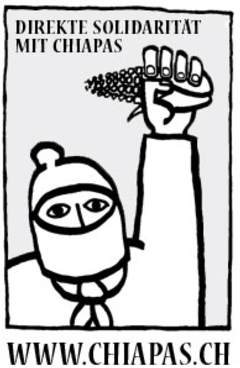The cooperative's establishment and development
Café Libertad's history
Café Libertad Kollektiv has been established July 15th, 1999; its objective was a tight connection between the development of a solidary economy and direct solidarity. The idea of importing Zapatista coffee from Chiapas has originated from anarcho-syndicalist structures in Hamburg. The project was aimed at supporting both union activities and the indigenous Zapatista movement's uprising in Chiapas as well as subsequently creating collective jobs.
The Zapatista coops' hour of birth dates back to the uprising of the indigenous liberation movement EZLN on January 1st 1994 when nearly a third of the Chiapas region was squatted. Subsequently, five autonomous regions have been established developing a self-organised economy against globalised exploitation conditions and postcolonial relations independently of official authorities and institutions.
Café Libertad 's history of solidary trade with Chiapas autonomous communities began importing 8 sacks of raw coffee with a detour via the US. Just a few weeks later fresh supply could be ordered because solidarity with rebellious communities and sales of solidarity coffee exceeded all expectations.
Subsequently, members of local union group FAU founded the collective working unpaid to import and distribute Zapatista coffee beyond the immediate circle of friends and acquaintances. The collective launched a website informing FAU groups and EZLN solidarity initiatives about the project.
In Switzerland comrades of the local solidarity group 'Direct Solidarity with Chiapas' established their own distribution structures and created Café RebelDía. Soon thereafter, friends and solidarity groups from Italy, Spain, France, Sweden, Great Britain and Greece joined the project having imported their first coffee sacks via Café Libertad and established their own various projects later on. Over the years, a European network of solidary coffee projects has evolved.
Our funding isn't just supporting coffee coops and Zapatista communities' autonomy but social and political movements all over the world. Furthermore, Café Libertad funding has supported workers on strike, helped to distribute the Strike Bikes and to establish independent production of squatted Greek factory vio.me.
In 2007, the work collective has been transformed from a 'proprietor-run' general partnership into a cooperative in order to remove it from the private property market and to legally collectivise it. Café Libertad has since been a registered cooperative and a member of the Central Association of Consumer Cooperatives (ZdK), a politically active organisation supporting the general idea, the interests and new establishments of small and medium cooperatives as a political and economic alternative.
Nowadays, Café Libertad Kollektiv is importing and distributing coffee for the daily uprising not only from Zapatista communities but from other rebellious coops as well like civil war refugees' project Finca Sonador in Costa Rica and women's coop Aprolma in Honduras. Additionally, we - with other solidarity groups - are organising the distribution of Spanish anarchist CNT red wine or solidarity olive oil 'for the movement's gears' from Greece, among others.
At the same time, there are always new questions and contradictions: How are we organising the coffee coops' financing and how are we developing prices for both small-scale farmers and solidary consumers? Which principles are guiding our cooperation with other groups and protagonists? How can our practice be a part of overcoming global injustice relations instead of justifying them anew as a more ethical type of capitalism and thereby merely perpetuating them in different terms?
Proximity and direct solidarity with indigenous and Zapatista communities, global networking with other projects and integration in social movements and mobilisations have been as important as Café Libertad's self-conception as a political project reaching beyond its own collective horizons.
In everyday life, at times this is working as intended, at other occasions, it doesn't. Yet, in spite of crises of the collective, we see it as a positive success story all have contributed to. Including all the people having supported Café Libertad's idea in various ways in the past until today. Or those enjoying a cup of coffee for the daily uprising first thing in the morning in order to be wide awake when contemplating a world that is not unchangeable but needs to be reinvented again and again.

